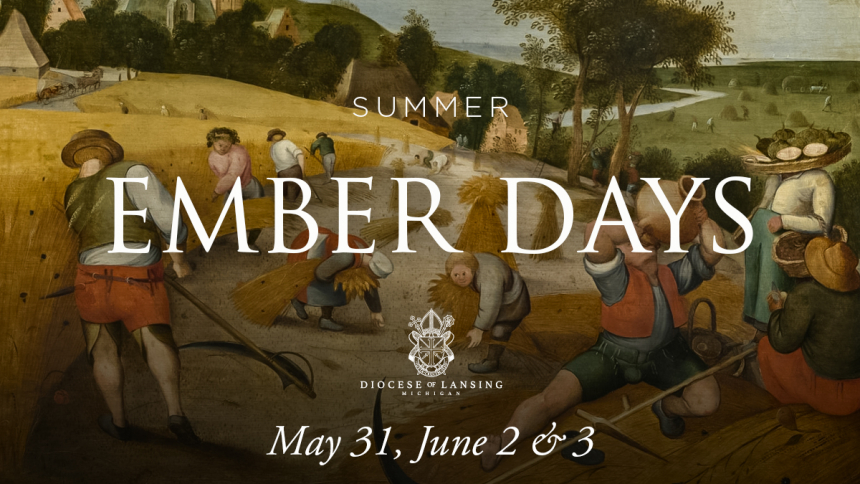
Tomorrow sees the beginning of the three Summer Ember Day: May 31, June 2, and 3. But what are Ember Days? And why do they matter? Here’s a great explainer by Will Bloomfield, General Counsel of the Diocese of Lansing. Will writes:
“Ember Days are traditionally days of fasting and partial abstinence (no meat except at the principal meal). Each of the four Embertides include three days of fasting and partial abstinence from meat – Ember Wednesday, Ember Friday (fasting and full abstinence from meat), and Ember Saturday. Ember Days occur quarterly around the beginnings of the four natural seasons, and are meant to focus us on God through His marvelous creation. The Ember Days should also remind us of our obligation to steward the earth.”
“So when are these four Embertides? The four Embertides are in Spring (the week after Ash Wednesday), Summer (after Pentecost Sunday), in Fall (after the Triumph of the Holy Cross), and in Winter (in Advent after the feast of St. Lucy). The easy way to remember this is the rhyme: Lenty, Penty, Crucy, Lucy.”
“By the time of the US Bishops’ 1966 Pastoral Statement on Penance and Abstinence, which removed the obligation of fasting during the whole season of Lent, Catholics were already no longer obliged to fast and abstain during ember days or vigils (the day before a feast). Nevertheless, the Bishops suggested that the devout would continue to “find greater Christian joy” in the Church’s liturgical feasts if the faithful continued to embrace these practices. Now that we are more than 50 years from the removal of these obligations, and most Catholics have grown up knowing only two obligatory fast days (Ash Wednesday and Good Friday), many Catholics have found that it remains salutary to step back from the modern world’s comforts and voluntarily embrace Ember Days and other traditional days of fasting and abstinence, particularly Fridays.”
“Another reason for embracing Ember Days and other days of fasting is that the greats of the Catholic spiritual tradition routinely encourage fasting as a key to unlocking deeper prayer. St. John Vianney explained the connection this way: “Unhappily, our hearts are not sufficiently pure and free from all earthly affections. If you take a very clean and very dry sponge, and soak it in water, it will be filled to overflowing; but if it is not dry and clean, it will take up nothing. In like manner, when the heart is not free and disengaged from the things of the earth, it is in vain that we steep it in prayer; it will absorb nothing.” Of course, Jesus Christ himself also spoke of the need for prayer and fasting and also modeled it.”
• For more on Ember Days: https://www.fisheaters.com/emberdays.html
• Based upon an article first published during Lent 2022.
